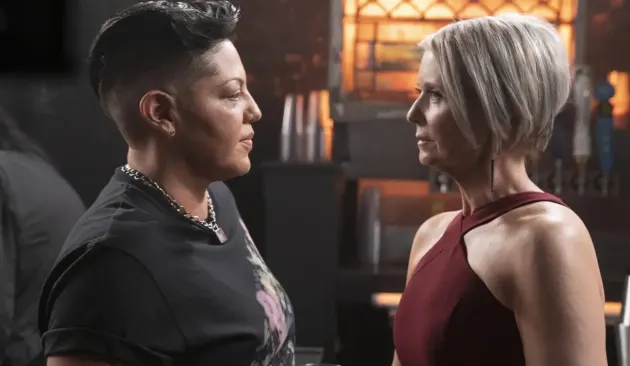In He’s Expecting, a 2022 six-episode Netflix drama, Kentaro Hiyama is a 37-year-old successful ad executive shocked to discover he’s one of a small percentage of cis men in Japan who have become pregnant. We watch him navigate some of the typical scenarios of a surprise pregnancy we’re used to seeing around women. He counts weeks to figure out who the mother is. He’s tired, nauseated, and unable to focus. At work, he’s quickly marginalized and left out, given work “anyone could do.” The project that was his idea is reassigned to his less talented and unpregnant male colleague. When he turns to the internet for advice on symptoms and worries, he’s talked to in the particular, patronizing, and bizarre communication style usually reserved for women (think “your little jumping bean” instead of “fetus”). Though, not bizarre, actually, if you want pregnant people to think what they’re doing isn’t serious or life-changing. Or if you want pregnant people to think they are people who should be talked to this way. “What’s with this lame design?” Kentaro says about a site called Pre-Mama Land. “Why do maternity products have such childish designs? The one who’s pregnant is an adult.”
I am very interested in empathetic pregnancy thought experiments, and have written many drafts of a novel in which I imagine a version of this, a man experiencing some of the sensations and effects of pregnancy and birth. I thought my interest lay in a safer exploration of how it felt for me. If a man is experiencing pregnancy, it’s at a distance, removed from me to the point of impossibility, and then I can examine it without fear. But in watching He’s Expecting I found myself also relating to the oppressor, thinking about pregnancy and birth as a miracle, and objectifying Kentaro’s pregnant body.
For me, pregnancy was lonely. I was the only passenger on an unstoppable train, destination 0-2 lives. Strangers’ smiles felt like hazing, my pregnancy cute and inconsequential to them. Even in rooms filled with other pregnant women, waiting rooms or birthing classes, we didn’t talk to each other. We were each on our own train with its own unknown destination. One of us arriving there alive with a living baby didn’t mean the same would happen for the rest of us. Maybe it even meant our chances went up for being the one something horrible happened to. People bought my future baby clothes, an assumption that felt dangerous. My husband wanted to have sex, of all things. Everyone around me drank alcohol and stood comfortably in the heat, while I felt temporarily removed from having any kind of shared experience.
Every one of us is here because someone gave birth. There’s something comforting about that idea.
In talking to my friend about this essay, she thought it was interesting that a pregnant person would feel more lonely than usual when there’s actually another person inside their body. It does seem paradoxical. Once, before I was ever pregnant, I visited my pregnant friend and asked, when she was alone in a room, did she feel like she was alone? She thought for a minute, maybe reflecting on the way she felt when she was alone, maybe wondering if it meant she didn’t have a deep enough connection to her fetus if she said yes. Yes, she said. She felt alone.
Maybe you feel alone, even when you can feel the baby moving and imagine a future together, because you’re facing something very much like death, if not actual death. One of my friends described herself laboring with her mother’s help. She said, perched over the toilet in the hospital room, she couldn’t do it and she wanted to stop. Her mom told her what you have to tell someone in this situation: the only way out was through, and no one could do it but her. There is an element of sacrifice in birth, one that if you wanted to be pregnant, you’re probably willing to make: a sacrifice of the way your body used to be, the way you spend your time, the way you use your mind, your sense of self, and sometimes, your actual life. I wanted to be pregnant both times, but I still resented the excitement of my community members for the arrival of the baby. I needed them. I needed them to support me, monitor me, sew me back together, to love the baby once they arrived, and also to consider how different the stakes were for me and for them.
Yes, birth is a tenuous tightrope between life and death, one I longed so badly for the people around me to acknowledge. After having a second hemorrhage outside the “window where it’s common” (the first 24 hours), I asked to talk to a doctor before being discharged and cornered her with unanswerable questions: Will it happen again? What are the signs to look out for that it will happen again? If it happens again, will I be able to get to the hospital before I die? With each question, she almost imperceptibly moved backwards away from my bed, finally shouting, “Childbirth is extremely dangerous!” And it was in this fleeting moment of honesty that I felt safe, that one other person and I understood each other.
A micromort is a unit of measurement defined by a one-in-a-million chance of death. Giving birth carries a risk of 120 micromorts vaginally. Birth by C-section is 170 micromorts, which is how the cis men in He’s Expecting give birth. If these numbers represent all births, they will be much higher when considering only Black mothers and much lower when considering mothers of other races, the lowest for white mothers. For anyone, they’re in a range much, much greater than skydiving (8), paragliding (74), and scuba diving (10), all things I would never do. And for a baby, simply living their first day of life is 430 micromorts, the same risk as base jumping.
At work, he’s quickly marginalized, given work ‘anyone could do.’ His project reassigned to his less talented and unpregnant male colleague.
When Kentaro vocalizes doubts to his boss about giving birth, he says, “I’m not sure I can actually do it.” His boss says, “You’ll be fine. Women get pregnant and give birth all the time. You’ll nail it.” I remember people telling me these exact words. Every one of us is here because someone gave birth. There’s something comforting about that idea. Everyone. The evidence of survival is everything you see around you. You can hide safely in these vast and real numbers. Billions. There’s something dismissive about it, too. You’ll nail it. You got this. What are the micromorts for other activities you might say that about. Giving a presentation? Scoring a goal? Jumping into a body of water? Kentaro’s boss gives him a supportive pat on the shoulder and catches up with another colleague leaving Kentaro standing alone in the hallway, gaze downward, hand on his stomach.
It’s not difficult to find Kentaro Hiyama attractive. He’s shaggy-haired, confident, and talented. Takumi Saito, the actor who plays Kentaro, is, among other things, a model. But it was when the character became pregnant that I was really drawn to him. His pregnant body, yes, was surprising and beautiful, but it was his singular, private experience that I found so alluring. He’s preoccupied, both inward- and outward-looking, and in both cases, concerned with something bigger than himself. That experience changes a person’s way of existing and relating to others. It changes the expression on their face. They’re not thinking about you. They’re not thinking about anything you’re thinking about.
When I think back on crushes I’ve had, part of the longing was longing for knowledge I couldn’t have: what was it like to be them? What music do you hear walking around Berlin nights in the ’80s? How humid is it when you visit your grandparents in Hunan Provence in July? These are experiences you can try to describe. You can try to close the gap between two bodies by one person saying, “You walk around crushed by disappointment that a girl you wanted to take out canceled your date and then you hear ‘Metropolis’ by Schwefel coming from a window.” Or, “You can tell your grandparents are disappointed that you didn’t have the correct expression on your face when their friend asked you a question.” And the other person can imagine feeling that way. What would those feelings feel like in me? If I can approximate, I can get closer to them.
After someone has been pregnant, they have another person’s DNA in their body forever. They contain actual multitudes.
The experience of pregnancy is paradoxically even more singular and isolating. Your experience is both marginalized by and mingled with someone else’s as you temporarily share a body. A compounding of two singular experiences, a quadrupling of impact like a head-on collision. You can say “my dreams are crazy, I can smell things miles away, I can’t lift my legs to put my own pants on, I’m treated differently by everyone around me, I’m worried about my job, I’m wondering when the last time I felt the baby move was,” but how do you describe the feeling of being cellularly connected to someone? Of sharing blood, fluid, calories, and chemicals?
For each pregnancy a person has, born or unborn, fetal microchimerism can occur, in which cells from the fetus are moved around the pregnant parent’s body and harbored in the tissues of different organs. Fetal cells can remain in the parent who carried them for decades, even until the end of life, and the cells are often credited with regrowth and repair of the organs they reside in. After someone has been pregnant, they have another person’s DNA in their body forever. They contain actual multitudes, unknowable even to themselves.
During both my pregnancies, my doctor asked what form of birth control I planned to use after delivery, and I said not to worry, I was never going to have sex again. The joke was unrealistic, but not untrue to my desires, in a state of loneliness nothing, especially sex, could remedy. I sometimes found it monstrous that my husband could be in such a wildly different emotional and mental state, to want to have sex when I was terrified, physically uncomfortable, and bearing the burden of keeping our baby safe all alone. Sex, I reminded everyone, was what got us into this mess in the first place. But maybe it’s that very state of loneliness and inaccessibility that makes pregnant people so attractive.
Aki, the mother of Kentaro’s child, is tall and thin with short hair. Perhaps the actress, Ueno Juri, was cast for her boyishness. She’s described as boyish on IMDB, even before her name appears. Her character is a freelance writer and photographer overloaded with work. She’s casual about her relationship with Kentaro, letting him come over or not as their busy schedules allow. When he tells her he’s pregnant she asks the familiar line we hear from men in this position, are you sure it’s mine?
When Kentaro asks Aki to sign an abortion consent form, she stalls, wondering aloud if the pregnancy is a blessing. She could have a baby without having to give birth, she says. Maybe it could even lead to new job opportunities for him as an ad man. Maybe, she says, it’s actually a huge stroke of luck. Kentaro listens a little resentfully and says, “Look, Aki. I’m actually pregnant.” “I get it,” she says. “You don’t,” he says. “I feel queasy all day. My boss is watching me. It’s already destroying my life. Don’t joke with me.” She apologizes and says she agrees they won’t have the baby. Kentaro says, “It’s not just about agreeing. Don’t make it sound so easy. I have to harm my body for an abortion. I’m the one who bears the risk whether it’s childbirth or an abortion.”
Recently, two friends, independently, told me I needed to deal with my anger. Two spontaneous interventions.
Clichés are useful when the show tries to show a flipping of tired male and female gender roles. The characters themselves often comment on it. Kentaro tells Aki she sounds “Just like one of those guys,” when Aki is dismissive about the effect pregnancy is having on Kentaro’s body. But the way I related to both Kentaro and Aki revealed to me that I am already embodying both the pregnant and the impregnator. My friend told me, “You’re already bought into the hegemony. Otherwise, you wouldn’t have had a second kid.”
Since having kids, I’ve had a constant, generalized hum of anger in the background of my days. Part of it is likely a reaction to some of the life-threatening experiences I had with my second birth. But part of it isn’t. I’ve had a hard time separating the lonely, dangerous experience of pregnancy from the institutions of heterosexual marriage and sex. Even as the country removes the right to healthcare for women and more and more states make abortion illegal, I know I am a white woman with enough money to have an abortion. I live in a state where abortion is legal and protected. I’m not presently at risk of forced birth except by myself. But I don’t want to have another baby or an abortion. I don’t want either. And to exist in a heterosexual marriage feels acutely dangerous to me in a way it is not to my husband.
Recently, two friends—independently—told me I needed to deal with my anger. Two spontaneous interventions. In an effort to help, they asked me questions: Am I gay? My friend who is gay reflected that she, too, had a lot of generalized anger before she came out. If I were independently wealthy, had so much money that all my possible needs were met, and had a ton of exciting and rewarding friendships, would I want to have sex with men? If my husband were pregnant, would I want to have sex with him? Would I want to impregnate my husband?
Imagining my husband pregnant is like imagining the United States without police. Impossible at first; I could feel my mind trying to change shape around this fundamental shift in reality, realizing all the features of our world, no matter how minor and unrelated they seemed, would be totally different, too. And then I couldn’t stop thinking about it, how much more sense everything made in a world like this. If childbearing were shared across genders, can you imagine it? Can you really imagine it? Men faced with the decision of whether or not to abort their own pregnancy. Men deciding on the right balance between breastfeeding and the independence they need for their mental health. Feeling guilty if they quit. Pumping in parking garages and designated conference rooms. Men stigmatized for needing government assistance for single dads. Men proudly telling their friends how quickly they got back down to their pre-pregnancy weight. Fathers talked to the way we talk to mothers. Fathers thinking about themselves the way mothers think about themselves.
He’s Expecting kind of tries to imagine it, but not in good faith. When the show could do anything, it still makes light of pregnancy, and particularly of a man being pregnant. Even while satirizing the Pre-Mama Lands of the world, it doubles down on the same style of infantilizing pregnant people and making the experience funny or inconsequential. When a doctor tells Kentaro he’s pregnant, he buys pregnancy tests to confirm. Women on the street giggle at him when they see he’s bought pregnancy tests and he walks away in an unnecessary, hip-swinging way, a feminine way, we’re supposed to understand, accompanied by playful music—though I’m not sure I’ve ever seen a woman walk like that. And why is it funny for a “man” to walk like a “woman?” Have you ever asked someone, after they tell a racist joke, why it’s funny? They don’t know. Why is it relieving to vocalize stereotypes and have other people laugh, acknowledging that they are aware of them, too. What do we do to ourselves when we laugh at the dehumanization of others?
Yes, I would want to have so much sex with my pregnant husband. I would feel so sorry for him and scared for him. I wouldn’t be able to stop touching him. I wouldn’t be able to stand not being able to help. Was his desire fueled by guilt? I would have felt less lonely if it had been, if we had had the same understanding of my experience in relation to his.
Would I want to impregnate him? Absolutely not. Even if he wanted me to, it’s too violent. Am I angry at him for doing to me an act so violent I couldn’t possibly commit it? Or could I?
How can you make a risky decision if the language used to describe it is purposefully and sinisterly playful, patronizing, and reductive?
In a scene where Aki and her friend discuss the pregnancy, her friend says, “It’s a pretty great time to be alive where men can give birth. I mean, being pregnant is tough. Nausea and headaches for months. People nagging you constantly until it’s born, like, ‘Don’t eat this, move that, go for a walk.’ You can’t drink or eat raw stuff. And to top it all off, the hellish pain of labor is waiting for you at the end. If a man did all that for me, I’d be over the moon.”
I would also be over the moon. Maybe I would impregnate my husband and make the consensual decision together, the same one we made for me, that we were willing to risk his and a future baby’s life for the chance at having one. Maybe I’m mad at his willingness to do that to me, and at my willingness to do that to him. Maybe I’m mad at life and death and fear and pain.
What can be helped are the Pre-Mama Lands who call this state, the delicate line between two lives and zero, a bun in the oven. Framing things in this way matters to the way society treats pregnancy, pregnant people, and the dangerous and life-changing process of birth. It matters to the way people think about themselves, their own worth, and what they want. How can you make a decision 15 times riskier than jumping out of a plane if the language used to describe it is purposefully and sinisterly playful, patronizing, and reductive?
Pregnancy is so much scarier than jumping out of a plane. It can (and usually does) happen by accident. It can happen by force. It can only happen to one group of people. And as soon as it happens, your human rights change. I wanted to have kids, I just wanted people to talk honestly, to me, about what it meant. Maybe what I wanted everyone to say instead of you’ll nail it, is, good luck. I love you. This might be the last thing you ever do.

















































![‘The Challenge: USA’ Recap Season 2, Episode 8: [Spoiler] Eliminated – TVLine ‘The Challenge: USA’ Recap Season 2, Episode 8: [Spoiler] Eliminated – TVLine](https://washingtonweeklytimes.com/wp-content/themes/jnews/assets/img/jeg-empty.png)








